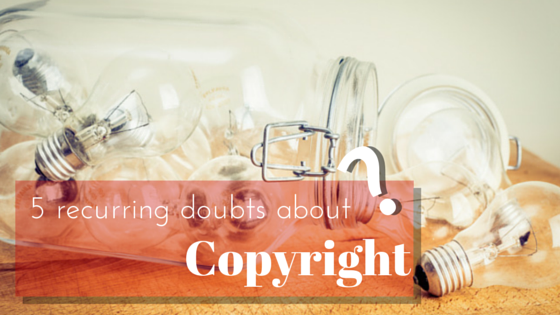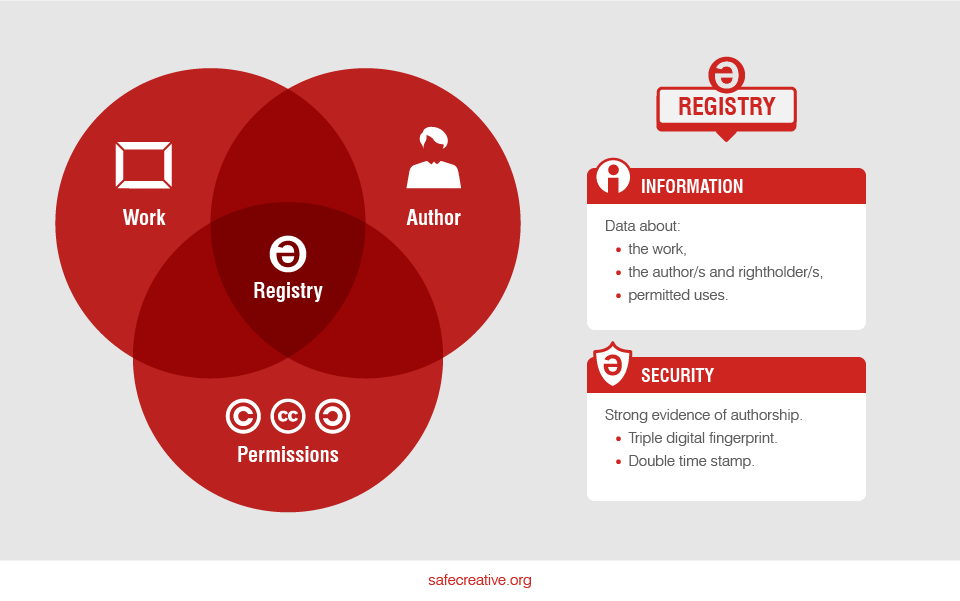
5 doubts about copyright which have surprised us

In the intellectual property world there are several issues which remain relatively unknown, often to our surprise. In this article we are going to highlight some of those we find more useful:
1. Is it true that your work becomes available for anyone to use freely when you share it online?
This is a very widely accepted but false notion. Nobody can use your work without your specified permission. But of course, misunderstandings happen. This is partly due to a lack of information and also because it can be difficult to contact the author and ask for their permission. Luckily there are many ways to prevent this from happening. To minimize the chance of misinformation, an author should make their contact data, or at least the license of the work, easily accesible.
Some solutions:
- Include this information inside the work’s metadata.
- Use SafeCreative’s registration code.
- If possible, include the information in the work itself, as a watermark or in a specific section of the document, for instance.
2. What happens if I register my work after finding it is being misused?
We don’t usually worry about the possibility of our work being plagiarised until we find ourselves in that situation. It is only then that we start generating proof of authorship. This can create problems because, if the piece is misused on 28th of April and your proof of authorship is created on 29th of April, this will not be convincing. Of course, there are ways to add more evidence: a draft, a sketch, a mockup, or even witnesses. But a registration of that same draft, made on a date previous to the misuse, is far better evidence. This kind of proof makes the jobs of judges, experts and lawyers much easier.
In short: Better safe than sorry.
3. How should I proceed when the infraction takes place through social network?
An increasing number of misuses happen online, through Facebook, Twitter, Instagram and many other platforms. When this happens the first and best approach is to contact the user themselves, informing them that they are using your work and asking them to remove it. If they refuse to remove it, you can contact the customer service of the site. Explain your complaint and send them evidence to prove that your work is being used without your consent and it will be up to them to remove the content.
SafeCreative’s registration certificates have already been successfully used in several plagiarism cases on Amazon and Facebook.
Following this procedure we can save ourselves a lot of money, time and stress, which we would have to spend if we were to take these plagiarism cases to court.
4. Does an artist need to be an expert in copyright?
The answer is simple: No. Our suggestion would be to stay as well informed as possible, but copyright is a complex matter. We try to keep the registration process as smooth and simple as possible, but we are aware that sometimes authors just do not have the time to spend on registering and managing the rights of all of their works. Copyright agents are professionals who are responsible for this task. They assess their clients needs and help them to manage their works’ rights, no matter what their work volume is.

5. Is “register” the same as “license”?
It can be easy to mix these two terms up. A registration is a means to prove, through a third party, who is the author of a work, under which license the work is being registered, on what date the proof itself was created, and it usually keeps a copy of the work to identify it. It provides safety and information. Therefore, it is best to register a work before distributing it. That way any following attempt of plagiarism would happen after your authorship evidence has been created and you would have valid proof of your rights to that work.
A license, while being part of the information contained in the registration, is not the same thing. A license is a document which contains all the terms and conditions for the usage of your work i.e. whether it is necessary to reference the author or not, if it can be distributed for commercial use, or if you allow other authors to create derivative works. Creative Commons licenses are probably the best known examples of licenses. Finally, just a reminder that copyright is not exactly a license. It is the absence of a license which by default means all the rights are reserved to the author. Any work from the moment of its creation is protected by copyright law.
Credits: Photography by Andrés Nieto Porras.

i have been using safe creative for a while , and like the new progress in the world wide web.